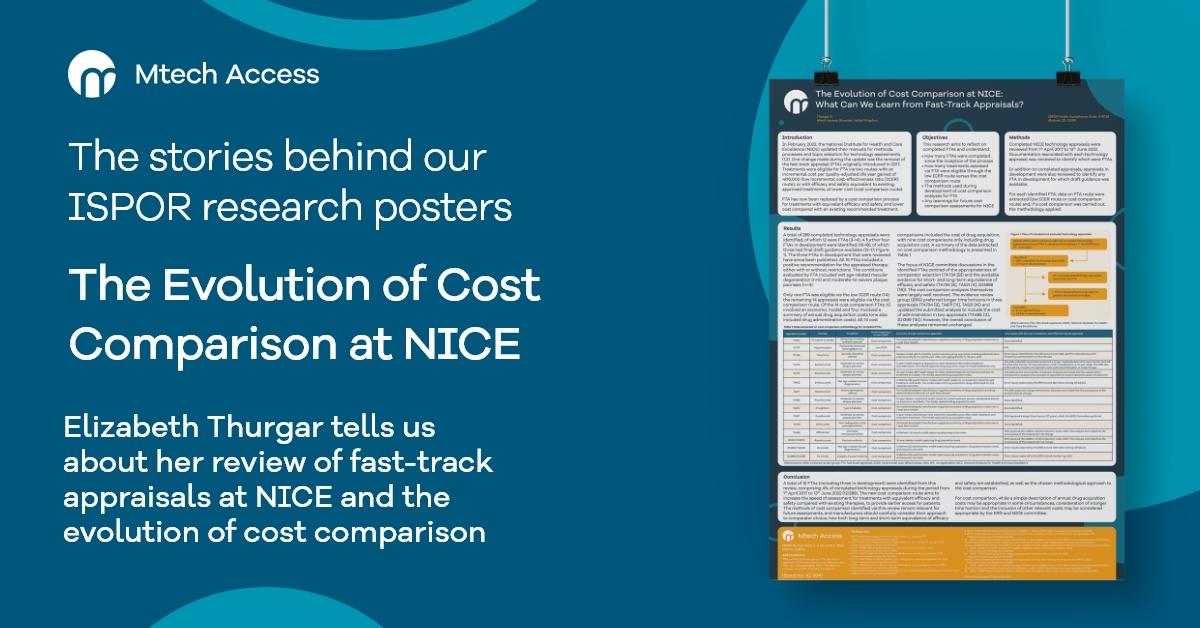
We speak to Elizabeth Thurgar (Director – Health Economics) to get the story behind the poster: ‘The Evolution of Cost Comparison at NICE: What Can We Learn from Fast-Track Appraisals?’. With fast-track appraisals (FTAs) at the National Institute for Health and Care Excellence (NICE) now replaced by cost comparison, Elizabeth’s poster explores what we can learn for future health economic evaluations for NICE submission.
In all, we presented 7 independent research posters at ISPOR Europe, from 7th–9th November 2022. In this series of interviews we sit down with poster authors to learn a bit more about their research.

What topic does your poster explore?
In February 2022, NICE published updated manuals for methods, processes and topic selection for health technology assessments. As part of this, the fast-track appraisal (FTA) process, first introduced in 2017, was replaced by a simplified cost comparison process.
Prior to February 2022, a product could be assessed by FTA via two routes:
- With an incremental cost per quality-adjusted life year gained of <£10,000 (low incremental cost-effectiveness ratio [ICER] route)
- With efficacy and safety equivalent to existing approved treatments at lower cost (cost comparison route)
This poster reports a review of completed FTAs since 2017 and reflects on what can be learned from these FTAs for future cost comparisons.
What inspired you to pursue this topic?
Though I have been lucky enough to work on an FTA with a client, I was aware that only a limited number of medicines had successfully navigated an FTA. Indeed, I was unaware of any that had been assessed via the low ICER FTA route. As FTAs were originally expected to provide faster access to medicines via a streamlined process, I was interested to understand how many medicines had been assessed via FTA. For those assessed via the cost comparison route, I was interested to understand what we could learn from the methodologies used.
What aspects of your findings would you highlight for our readers?
I identified 16 FTAs, of which only one was assessed via the low ICER route. There was documentation available on the NICE website for 14 of the remaining 15 cost comparisons. Of these, 10 involved an economic model, with the remaining four providing a simple annual summary of expected costs.
Were the results as you anticipated when you began your research?
My hypothesis was that there were only a handful of FTAs and that the majority, if not all of these, would have been undertaken via a cost comparison route.
I was surprised to find that there was in fact one FTA assessed via the low ICER route. And, although there are a limited number of FTAs, interestingly, there seemed to be an increase in FTA appraisals carried out in the last year. Six of the 16 FTAs were published in 2022, with the remaining 10 published over the preceding 5 years.
What was your most important conclusion?
The focus of NICE committee discussions around cost comparison FTAs centred on the appropriateness of comparator selection and the available evidence for short- and long-term equivalence of efficacy and safety.
Manufacturers should therefore focus on understanding their clinical data and the most appropriate comparator for the evaluation. The cost comparison analyses themselves varied in complexity but, in general, were largely well received.
What’s the next step for your research?
It will be interesting to see how cost comparison evolves at NICE under the new methods and whether there is an increase in the number of cost comparison assessments.
What was it like presenting the poster live at ISPOR Europe?
I thoroughly enjoyed being at ISPOR this year and seeing so many familiar faces as well as lots of new ones. The poster sessions were really well attended and I met and chatted to so many different people.
View the poster here.
If you would like to discuss this research with the Elizabeth or to learn more about how we can support you with health economic modelling and/or health technology assessment, email info@mtechaccess.co.uk.


